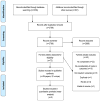The cost-effectiveness of universal newborn screening for bilateral permanent congenital hearing impairment: systematic review
- PMID: 22583631
- PMCID: PMC3600428
- DOI: 10.1016/j.acap.2012.02.002
The cost-effectiveness of universal newborn screening for bilateral permanent congenital hearing impairment: systematic review
Abstract
Objective: Universal newborn hearing screening for bilateral permanent congenital hearing impairment is standard practice in many developed economies, but until there is clear evidence of cost-effectiveness, it remains a controversial use of limited health care resources. We conducted a formal systematic review of studies of newborn hearing screening that considered both costs and outcomes to produce a summary of the available evidence and to determine whether there was a need for further research.
Methods: A search was conducted of medical and nursing databases and gray literature websites by the use of multiple keywords. The titles and abstracts of studies were examined for preliminary inclusion if reference was made to newborn hearing screening, and to both costs and outcomes. Studies of potential relevance were independently assessed by 2 health economists for final inclusion in the review. Studies that met inclusion criteria were appraised by the use of existing guidelines for observational studies, economic evaluations and decision analytic models, and reported in a narrative literature review.
Results: There were 22 distinct observational or modeled evaluations of which only 2 clearly compared universal newborn hearing screening to risk factor screening for bilateral permanent congenital hearing impairment. Of these, the single evaluation that examined long-term costs and outcomes found that universal newborn hearing screening could be cost-saving if early intervention led to a substantial reduction in future treatment costs and productivity losses.
Conclusions: There are only a small number of economic evaluations that have examined the long-term cost-effectiveness of universal newborn hearing screening. This is partly attributable to ongoing uncertainty about the benefits gained from the early detection and treatment of bilateral permanent congenital hearing impairment. There is a clear need for further research on long-term costs and outcomes to establish the cost-effectiveness of universal newborn hearing screening in relation to other approaches to screening, and to establish whether it is a good long term investment.
Copyright © 2012 Academic Pediatric Association. Published by Elsevier Inc. All rights reserved.
Similar articles
-
Current practice, accuracy, effectiveness and cost-effectiveness of the school entry hearing screen.Health Technol Assess. 2007 Aug;11(32):1-168, iii-iv. doi: 10.3310/hta11320. Health Technol Assess. 2007. PMID: 17683682
-
Home treatment for mental health problems: a systematic review.Health Technol Assess. 2001;5(15):1-139. doi: 10.3310/hta5150. Health Technol Assess. 2001. PMID: 11532236
-
A rapid and systematic review of the clinical effectiveness and cost-effectiveness of topotecan for ovarian cancer.Health Technol Assess. 2001;5(28):1-110. doi: 10.3310/hta5280. Health Technol Assess. 2001. PMID: 11701100
-
What is the value of routinely testing full blood count, electrolytes and urea, and pulmonary function tests before elective surgery in patients with no apparent clinical indication and in subgroups of patients with common comorbidities: a systematic review of the clinical and cost-effective literature.Health Technol Assess. 2012 Dec;16(50):i-xvi, 1-159. doi: 10.3310/hta16500. Health Technol Assess. 2012. PMID: 23302507 Free PMC article.
-
A rapid and systematic review of the clinical effectiveness and cost-effectiveness of paclitaxel, docetaxel, gemcitabine and vinorelbine in non-small-cell lung cancer.Health Technol Assess. 2001;5(32):1-195. doi: 10.3310/hta5320. Health Technol Assess. 2001. PMID: 12065068
Cited by
-
An Economic Evaluation of Australia's Newborn Hearing Screening Program: A Within-Study Cost-Effectiveness Analysis.Ear Hear. 2022 May/Jun;43(3):972-983. doi: 10.1097/AUD.0000000000001153. Ear Hear. 2022. PMID: 34772837 Free PMC article.
-
Is Early Intervention Effective in Improving Spoken Language Outcomes of Children With Congenital Hearing Loss?Am J Audiol. 2015 Sep;24(3):345-8. doi: 10.1044/2015_AJA-15-0007. Am J Audiol. 2015. PMID: 26649545 Free PMC article.
-
Cost-effectiveness analysis of hearing screening program for primary school children in southern Iran, Shiraz.BMC Pediatr. 2022 May 30;22(1):318. doi: 10.1186/s12887-022-03384-1. BMC Pediatr. 2022. PMID: 35637460 Free PMC article.
-
Early hearing detection and intervention (EHDI) programmes for infants and young children in low-income and middle-income countries in Asia: a systematic review.BMJ Paediatr Open. 2023 Jan;7(1):e001752. doi: 10.1136/bmjpo-2022-001752. BMJ Paediatr Open. 2023. PMID: 36720503 Free PMC article.
-
Congenital hearing loss.Nat Rev Dis Primers. 2017 Jan 12;3:16094. doi: 10.1038/nrdp.2016.94. Nat Rev Dis Primers. 2017. PMID: 28079113 Free PMC article. Review.
References
-
- Apuzzo M, Yoshinaga-Itano C. Early identification of infants with significant hearing loss and the Minnesota Child Development Inventory. Semin Hear. 1995;16:124–139.
-
- Kennedy CR, McCann DC, Campbell MJ, et al. Language ability after early detection of permanent childhood hearing impairment. N Engl J Med. 2006;354:2131–2141. - PubMed
-
- Yoshinaga-Itano C, Coulter D, Thomson V. The Colorado Newborn Hearing Screening Project: effects on speech and language development for children with hearing loss. J Perinatol. 2000;20:S132–137. - PubMed
-
- Davis A, Bamford J, Wilson I, et al. A critical review of the role of neonatal hearing screening in the detection of congenital hearing impairment. Health Technol Assess. 1997;1(10) - PubMed
-
- Bailey HD, Bower C, Krishnaswamy J, et al. Newborn hearing screening in Western Australia. Med J Australia. 2002;177:180–185. - PubMed
Publication types
MeSH terms
Grants and funding
LinkOut - more resources
Full Text Sources
Medical
Miscellaneous


